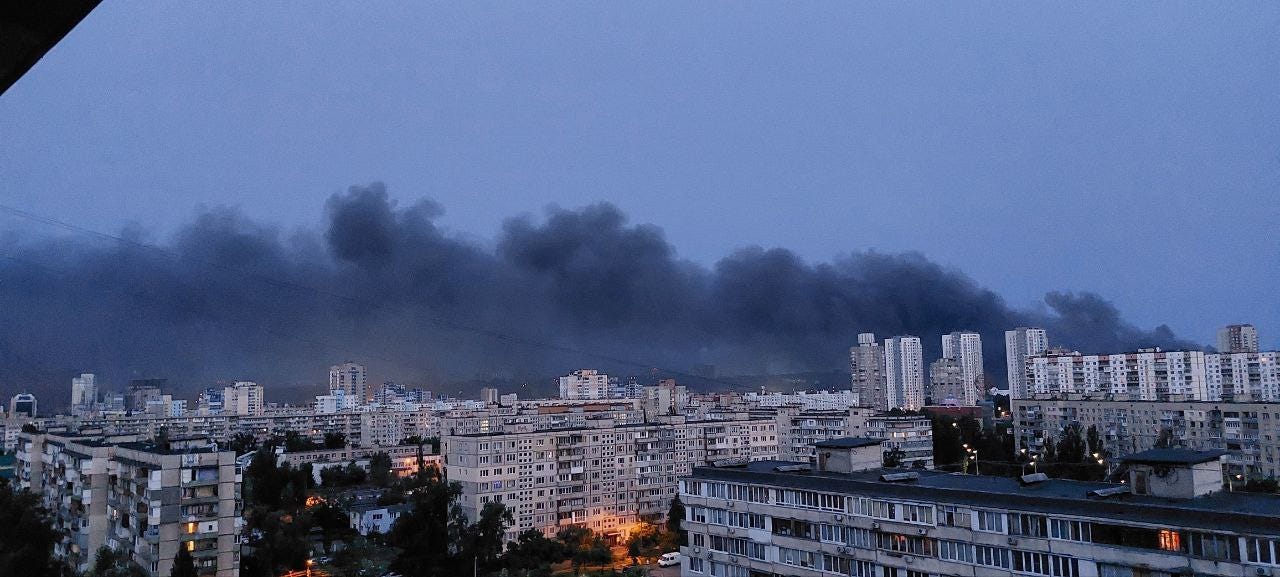“A Tough Night for All of Us”: Russia Unleashes Record Drone Assault on Kyiv and Odesa
With over 300 drones launched overnight and missiles striking civilian infrastructure—including a maternity ward in Odesa—Ukrainians endured one of the most intense and terrifying bombardments
Russia launched 315 drones at Ukraine overnight into Tuesday in what was descried as one of the largest-ever attacks on the capital, CNN reported. Officials said a maternity ward in the southern port city of Odesa had been hit. Air raid sirens blared across Kyiv just after midnight, announcing an imminent Russian attack. What followed was a terrifying night that lasted about five hours. Hiding in basements, public shelters and corridors and bathrooms – often the safest spots in their homes – Kyiv residents could hear and feel the loud thuds of explosions. In the heavily protected diplomatic quarter, drones could be heard buzzing overhead after about 3am. Their number was unusual: While Russia has significantly increased the scale and frequency of drone attacks in recent weeks, a handful at most would be heard in Kyiv during previous assaults. Meanwhile, a separate wave of attacks hit the southern city of Odesa, where residents said they couldn’t remember a night of so many strikes. At least two men were killed and nine people wounded in the port city, according to a Telegram post from the region’s Prosecutor’s Office. One of the Russian strikes hit a maternity ward of a hospital in the city, according to Andriy Yermak, the president’s chief of staff. Russia also launched two KN-23 ballistic missiles and five Iskander-K cruise missiles in the overnight attack, Ukraine’s Air Force said. The overnight attacks follow Russia’s biggest drone strike on Ukraine on Monday, where Russia fired 479 UAVs in an overnight aerial assault, surpassing the highest number of drones Moscow has launched in a single day for the second consecutive weekend. Seven districts of the capital were hit by the Russian attacks and falling debris. High-rise buildings, homes, cars and warehouses were left burning, according to Tymur Tkachenko, head of the Kyiv city military administration, who said it was a “tough night for all of us.” One person was killed, according to Tkachenko, while Kyiv Mayor Vitaliy Klitschko said four people were also wounded - CNN
The European Commission is expected to today present its latest tranche of sanctions on Russian energy exports and financial institutions. Three EU officials who were granted anonymity to confirm the timing of the plan told POLITICO that the package — the 18th to be imposed on Moscow since the start of the full-scale war in Ukraine — is set to be circulated later today. The new measures are designed to restrict the operations of companies with links to the Nord Stream gas pipelines in the Baltic Sea, diplomats previously confirmed, as well as to the banks the Kremlin uses to move funds internationally - Politico
My hot take comment: The massive Russian drone strike overnight—preceded by several others in recent days—raises a pressing question: how is Russia able to so quickly replenish its stockpile of drones, derisively nicknamed “mopeds” by Ukrainians? The most likely enablers are Iran and North Korea, with a quiet but significant assist from China. With friends like these, the Kremlin can afford to make many enemies. Western partners must act more decisively to disrupt this supply chain. That means making it far harder for Russia’s allies to ship drone components and technology. Key steps include cracking down on Russia’s shadow fleet operating in international waters, tightening customs inspections, and imposing tougher sanctions on suppliers, intermediaries, and financial facilitators. Equally important is shutting down the flow of oil revenues that continue to fund Russia’s war machine. As NATO’s new chief, Mark Rutte, noted yesterday, Russia is now producing more tanks and vehicles in three months than all of NATO combined in a year. China and India—major buyers of Russian oil and gold—must be called to account. The upcoming G7 summit in Canada is a critical opportunity to increase pressure on both Beijing and Delhi to stop enabling Putin’s war economy.
Watch my 60-second explainer of the overnight Russian drone attacks on Kyiv and Odesa, filmed this morning on the streets of central Kyiv…
People in Britain had “better learn to speak Russian” if the Government does not ramp up defence spending, Mark Rutte has suggested. The Nato secretary general also warned that Russia could attack Nato by 2030 in a speech in London on Monday. Asked by The Telegraph if Rachel Reeves should increase taxes to fund a defence budget of 5 per cent of GDP, Mr Rutte said: “If you do not go to the 5 per cent, including the 3.5 per cent for defence spending, you could still have the NHS…the pension system, but you better learn to speak Russian. That’s the consequence.” The Nato secretary general has for weeks been pressuring allies to boost spending on defence and security to a combined 5 per cent in order to placate Donald Trump, who has threatened to withdraw American troops from Europe. Mr Rutte, who also met Sir Keir Starmer in Downing Street on Monday, was speaking hours after Russia launched its largest-ever drone attack against Ukraine, triggering Nato to scramble jets in Poland. “We see in Ukraine how Russia delivers terror from above, so we will strengthen the shield that protects our skies,” Mr Rutte said. He added that Nato needs “a 400-percent increase in air and missile defence” to maintain credible deterrence and defence. “The fact is, we need a quantum leap in our collective defence,” he said. He said “we are all on the eastern flank”, referring to the border with Russia, adding that the distance between European capitals is “only a few minutes” for Russian missiles. One of the central messages from Mr Rutte’s speech in London urged alliance members to boost capabilities to produce materiel, arguing that Nato armies needed “thousands more armoured vehicles and tanks”. “Russia produces in three months what the whole of Nato produces in a year,” he said, which was followed by another stark warning: “Russia could be using military force against Nato in five years.” - Daily Telegraph
“Russia produces in three months what the whole of Nato produces in a year,” he said, which was followed by another stark warning: “Russia could be using military force against Nato in five years.” - NATO chief Mark Rutte
The Pentagon approved the deployment of 700 U.S. Marines from Camp Pendleton to Los Angeles with a mission of helping to protect federal agents and buildings. On Monday evening, a military convey was seen traveling from Twentynine Palms toward Los Angeles. Gov. Gavin Newsom called the deployment a “blatant abuse of power” and said the state would sue to challenge the move. Newsom’s announcement concerning the Marines comes on the heels of a federal lawsuit the state filed Monday morning over the mobilization of the state’s National Guard during the weekend’s immigration protests. President Donald Trump also ordered the mobilization of an additional 2,000 California National Guard troops to L.A. on Monday night. Newsom criticized the action on X, calling it “reckless.” Monday’s protests were calmer than Sunday’s. By midnight, ongoing immigration protests in downtown L.A. and Santa Ana had largely dispersed. Officers used less-lethal munitions and tear gas as they clashed with a few dozen people who remained in downtown Los Angeles. Earlier in the day, a crowd several hundred strong had rallied in front of the federal building - LA Times
Angelenos without documentation are used to operating under the threat of immigration enforcement, but the recent series of raids has elevated the danger of everyday actions, like simply going to work and school. Some migrant workers are now avoiding areas that are perceived as high risk — such as downtown Los Angeles and stores including Home Depot and Food for Less, said Megan Foronda. The 32-year-old is secretary general of Migrante, an alliance of Filipino worker and migrant organizations. Foronda said some children have also been staying home from school because they’re scared their families or parents will be taken from them. “A lot of Filipinos are caregivers and have even decided to stay inside the facilities and care homes that they work in and not leave,” Foronda said. “There’s just a lot of fear that people are having and wanting to avoid even going to public places, so that’s something we’ve been seeing. People want to keep a low profile.”
A federal judge on Sunday declined to block President Trump’s removal of three board members of the Corporation for Public Broadcasting (CPB), ruling the plaintiffs failed to demonstrate a strong likelihood the firings were unlawful or that they would suffer irreparable harm. But CPB officials celebrated the ruling as a win, pointing to part of the ruling that acknowledges that “Congress intended to preclude the President (or any subordinate officials acting at his direction) from directing, supervising, or controlling the Corporation.” Following the ruling, CPB President and CEO Patricia Harrison signed a document affirming that the three members remain on the board, according to a source familiar. U.S. District Judge Randolph Moss in Washington, D.C., rejected a request for a preliminary injunction filed by the three board members — Laura Ross, Diane Kaplan and Thomas Rothman — who sued the Trump administration after receiving termination notices via email on April 28. The suit comes as Trump has urged Congress to defund public broadcasters and his Federal Communications Commission chair has vowed to investigate outlets like NPR and PBS over their donation models and perceived editorial bias - The Hill
Most people think of lotus roots as crispy and easily broken, but Chinese researchers have discovered they possess high-strength composite structures that could allow them to be used to help repair bones. "Through a series of processing steps, the strength of lotus root composite materials is further increased, making them able to maintain a relatively long-lasting support strength," said Wu Jun, associate professor of Bioscience and Biomedical Engineering Thrust at The Hong Kong University of Science and Technology (Guangzhou). Four years ago, Wu — who is also associate dean of the university's systems hub — and his team began experimenting with various biomaterials derived from foods such as lotus roots for use as bone repair materials and skin wound dressings on a variety of experimental animals. "Lotus roots are natural materials with continuous pores that can provide a good external environment for bone regeneration," Wu said - China Daily





